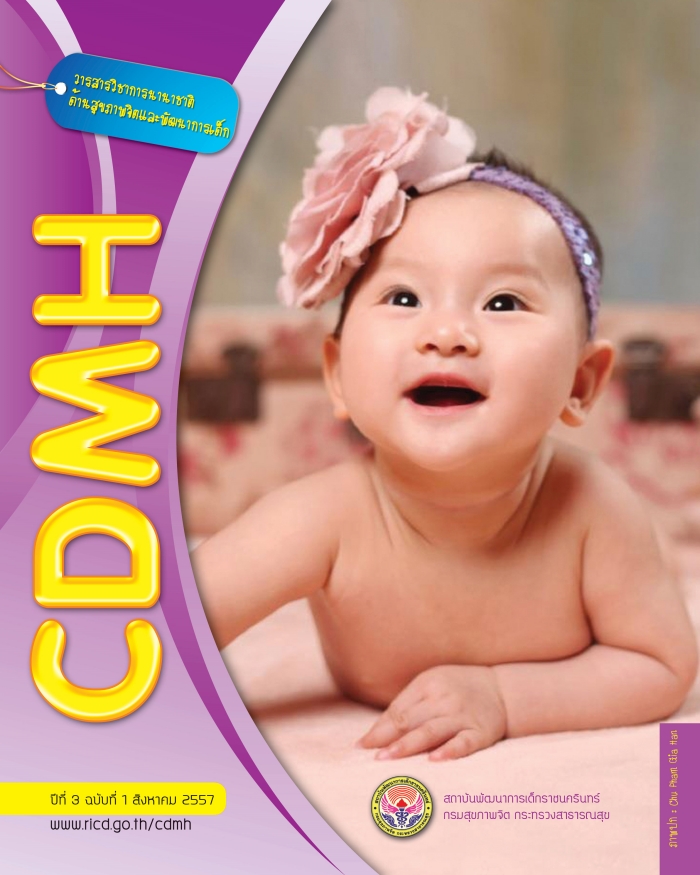Happiness and Depression among Disabled People in RICD Wheelchair Project
Main Article Content
Abstract
การวิจัยครั้งนี้มีวัตถุประสงค์ เพื่อศึกษาความสุขและความซึมเศร้าของคนพิการ กลุ่มตัวอย่างเป็นคนพิการที่เข้ารับอุปรณ์ช่วยความพิการจากโครงการ RICD Wheelchair Project ของสถาบันพัฒนาการเด็กราชนครินทร์ จำานวน 1,040 คน เครื่องมือที่ใช้ในการวิจัยเป็นแบบสอบถามจำแนกเป็น 3 ส่วน ได้แก่ ส่วนที่ 1 แบบสอบถามข้อมูลส่วนบุคคล ส่วนที่ 2 ดัชนีชี้วัดความสุขคนไทย ส่วนที่ 3 แบบประเมินความซึมเศร้า ทำการวิเคราะห์ข้อมูลด้วยสถิติค่าร้อยละ ค่าเฉลี่ย ค่าเบี่ยงเบนมาตรฐาน Kolmogorov-Smirnov และ Chi-square test ผลการวิจัยพบว่า คนพิการมีความสุขมากกว่าคนทั่วไป
มีจำานวนมากที่สุดคิดเป็นร้อยละ 52.0 รองลงมามีความสุขเท่ากับคนทั่วไปคิดเป็นร้อยละ 25.7 และมีความสุขน้อยกว่าคนทั่วไปคิดเป็นร้อยละ 22.3 คนพิการส่วนใหญ่ไม่มีภาวะซึมเศร้าคิดเป็นร้อยละ 85.1 และน่าจะมีภาวะซึมเศร้าคิดเป็นร้อยละ 14.9
The purpose of this research was to study the happiness and depression among disabled people in RICD Wheelchair Project. The subjects consisted of 1,045 disabled people in RICD Wheelchair Project. The research instrument was a set of questionnaires divided into three parts. The first part was the demographic data; the second part was Thai Happiness Indicator (THI) and the third part was the Screening Test for Depression. The data was analyzed by percentage, mean, standard deviation, Kolmogorov-Smirnov and Chi -square test. The results of this study were as follows : The 52.0 percentage of disabled people was more happy than normal people, 25.7 percentage of disabled people was happy equal normal people and 22.3 percentage of disabled people was less happy than normal people. The 85.1 percentage of disabled people was nor mal and 85. 1 percentage of disabled people probably had major depression.
Article Details
The authors retain copyright and permit the journal the copyright of first publication
Articles, once having passed the review process and accepted for publication in the CDMH Journal, are copyrighted under the CDMH Journal, Department of Mental Health, Ministry of Public Health. Please be aware distribution of CDMH Journal content for commercial purposes without permission is expressly prohibited. However, distribution with intent to educate, advocate, or spread awareness within the general public and research communities is permitted and encouraged with the understanding that the CDMH Journal Editorial Board do not hold jurisdiction or liability for any accompanying comments, text, or information from third parties, either in favor for or against the original article’s assertions, conclusions, methodology, or content.


